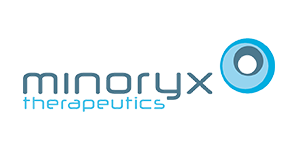
Minoryx presents topline results from Phase 2/3 “ADVANCE” study
demonstrating significant clinical benefit of leriglitazone in
adrenomyeloneuropathy (AMN)
• Largest prospective efficacy study conducted in the orphan disease AMN
• Leriglitazone significantly reduces progression of cerebral lesions and myelopathy symptoms
• Minoryx preparing for discussions with regulators for approval of leriglitazone for AMN patients
Mataró, Barcelona, Spain, January 26, 2021 – Minoryx Therapeutics, a Phase 3 clinical stage biotech company focused on the development of differentiating treatment options in orphan central nervous system (CNS) disorders, today announces topline results from its Phase 2/3 ADVANCE clinical trial. The study evaluated leriglitazone, a novel, selective PPARγ agonist, in male patients with adrenomyeloneuropathy (AMN), a neurodegenerative disease causing progressive spastic paraparesis and autonomic nervous system dysfunction. Additionally, AMN patients are at risk of developing progressive cerebral lesions, a devastating form of the disease leading to rapid severe disability and fatal if left untreated.
“AMN is a condition with a high unmet medical need with no currently approved treatment. Minoryx’s Phase 2/3 ADVANCE study is a landmark study in this indication, as it is the first large, robust and definitive study with protocol outcomes endorsed by the European Medicines Agency (EMA) and the US Food and Drug Administration (FDA),” said Uwe Meya, CMO, Minoryx. “Leriglitazone demonstrated significant clinical benefits in multiple endpoints in patients suffering from AMN, although results of the primary endpoint were inconclusive in the overall population. These clinical outcomes, together with those showing reduction of cerebral lesion progression, hold promise for patients suffering from AMN who currently have no available therapeutic options.”
The ADVANCE trial was a pivotal multicenter, double-blind and placebo-controlled study conducted in the United States and Europe. 116 patients were enrolled and randomized to either leriglitazone or placebo treatment in a 2:1 ratio. The treatment duration was 96 weeks and 96 patients completed the study. About 90% of patients elected to move into the open label extension where data will continue to be collected. Treatment with leriglitazone demonstrated PPARγ engagement in all patients within the target range required for efficacy as assessed by a biomarker (adiponectin).
Key topline results of the 2-year double-blind treatment phase include:
- Although the primary endpoint, change from Baseline in the 6-minute walk test (6MWT), was not met in the overall population, a statistical and clinically meaningful difference was observed in early symptomatic patients.
- For Body Sway, which reflects the most relevant neurophysiological system affected in AMN, patients treated with leriglitazone showed statistically significant differences vs. placebo on various parameters and in conditions including ‘eyes closed, feet together’ (p=0.036 and p=0.003, for total and mediolateral endpoints, ANCOVA) and ‘eyes closed, feet apart’ (p=0.004 for anteroposterior endpoint, ANCOVA). These data strongly indicate that leriglitazone can slow down the progression of AMN and loss of control over balance and body posture.
- Leriglitazone also consistently showed favorable trends when compared to the placebo group in the two comprehensive clinical rating instruments used, the Expanded Disability Status Scale (EDSS) and the Severity Score System for Progressive Myelopathy (SSPROM), with p values below 0.1 (ANCOVA). Furthermore, these beneficial effects on progression of myelopathy were more prominent in patients with more recent onset of myelopathy symptoms.
- The improvement in these functional tests and neurological rating scales demonstrated a consistent and clinically meaningful effect in the overall population. This improvement also translated into an effect in the patient- and clinician-based assessment of global improvement and the EuroQol Quality of Life Scale (EQ-5D-5L).
- Finally, and importantly, Leriglitazone significantly reduced cerebral lesion progression, a pre-specified secondary endpoint, as assessed by imaging and clinical follow up:
- Central reading of serial magnetic-resonance imaging (MRI), evaluated by two independent readers blinded to treatment assignment, showed that eight of the 39 patients in the placebo arm showed new or progressing cerebral lesions when compared with three of 77 patients in the active arm (p=0.0066; one-sided Fisher’s test).
- Six patients randomized to the placebo arm who showed cerebral lesion progression were also independently reported by sites as having clinically progressive cALD. No such cases were observed in any of the 77 patients randomized to the active treatment arm (p=0.0015; one-sided Fisher’s test).
- Additionally, in the overall patient population, patients treated with leriglitazone showed significantly less of an increase in Loes scores, a neuroradiological measure of cerebral lesions (p=0.024, ANCOVA).
- Biochemical markers of neuronal damage and inflammation such as neurofilament light confirmed a protective effect of leriglitazone on neuronal tissues.
- Leriglitazone was generally safe and well tolerated. As expected, based on the mechanism of action of the compound, weight gain and edema were the most frequent adverse events associated with leriglitazone treatment. Importantly no events indicating an increased cardiac risk were detected in this population.
“Occurrence of cerebral inflammatory brain involvement in AMN patients is life-threatening. Our data suggest that this risk can be reduced significantly,” said Wolfgang Koehler, MD, coordinator Principal Investigator for ADVANCE, University of Leipzig Medical Center.
“Neurodegeneration for AMN patients is more pronounced in the earlier stages of the disease, leveling off for those with a longer disease duration. Although for the secondary endpoints, the effect was already observed over the entire patient population, for the primary endpoint of this clinical trial, clear differences versus placebo were observed only for those patients with a shorter disease duration, implicating the urgent need of an early treatment onset.”
“On the basis of the overall results from this clinical trial, Minoryx is now preparing for discussions with regulatory authorities for defining a path forward for registration of leriglitazone for AMN sufferers,” said Marc Martinell, CEO, Minoryx. “Minoryx remains committed to investigating the benefits of leriglitazone in further patient populations. Minoryx is currently conducting a pediatric study to investigate the effects of leriglitazone on disease progression of boys aged between two and 12 years old with the cerebral phenotype of XALD (X-linked adrenoleukodystrophy), cerebral adrenoleukodystrophy (cALD).”
Leriglitazone has been granted orphan drug status for X-linked adrenoleukodystrophy from the FDA and the EMA and fast track and rare pediatric disease designation from the FDA for the treatment of X-ALD. Minoryx is currently undertaking further data analyses and plans to discuss the filing path with regulatory authorities in the coming months.
About Minoryx
Minoryx is a clinical stage biotech company focusing on the development of novel therapies for orphan CNS diseases with high unmet medical needs. The company’s lead program, leriglitazone (MIN-102), a novel, selective PPARγ agonist, is currently being evaluated in Xlinked Adrenoleukodystrophy (X-ALD) and Friedreich’s ataxia. The company is backed by a syndicate of experienced investors, which includes Caixa Capital Risc, Roche Venture Fund, Ysios Capital, Kurma Partners, Fund+, Chiesi Ventures, S.R.I.W, Idinvest, SFPI-FPIM, HealthEquity and Sambrinvest, and has support from a network of other organizations. Minoryx was founded in 2011, is headquartered in Spain with Belgian facilities and has so far raised more than €85M.
www.minoryx.com
About leriglitazone
Leriglitazone (MIN-102) is Minoryx’s novel orally bioavailable and selective PPARγ agonist with a potential first-in-class and best-in-class profile indicated for CNS diseases. It has demonstrated sufficient brain penetration and a favorable safety profile. It showed robust preclinical proof-of-concept in animal models of multiple diseases by modulating pathways leading to mitochondrial dysfunction, oxidative stress, neuroinflammation, demyelination and axonal degeneration.
About X-ALD
X-ALD (X-linked adrenoleukodystrophy) is an orphan neurodegenerative disease. The global incidence of X-ALD is approximately 6.2/100,000 live births and AMN and cALD are the two most common phenotypes. AMN affects all patients reaching adulthood and is characterized by progressive spastic paraparesis, sensory dysfunction and incontinence. This form progresses chronically with onset of symptoms typically in adulthood, affecting both men and women and has poor prognosis.
cALD is mostly affecting males, with an age of onset typically between 4-8 years. Moreover, recent literature suggests that up to 60% of AMN patients develop cALD in an average time of 10 years since onset of myelopathy. Untreated cALD patients progress quickly, as severe neurological function impairment appears 6-24 months after disease onset, leading to permanent disability and death within 2-4 years.
There is currently no approved treatment available for AMN. The only available treatment for cALD is hematopoietic stem cell transplantation (HSCT). However, there is no evidence that HSCT prevents patients from progressing to AMN later in their lives.
Contact Information:
Image Box Communications
Neil Hunter / Michelle Boxall
Tel +44 (0)20 8943 4685
neil@ibcomms.agency / michelle@ibcomms.agency
